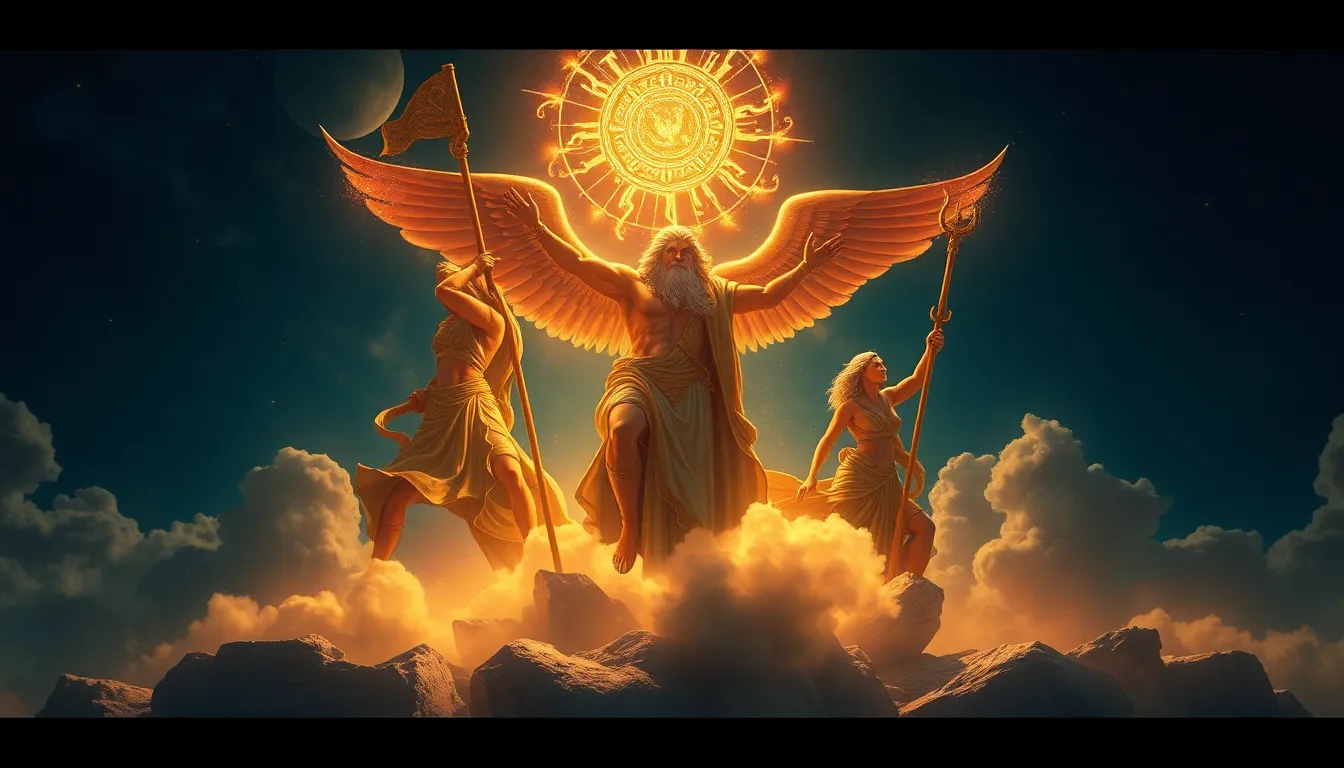The Divine Influence: How Greek Gods Shaped Mortal Destiny
I. Introduction
Greek mythology is a rich tapestry of stories that have captivated human imagination for centuries. It encompasses a vast array of tales featuring gods, goddesses, heroes, and mythical creatures, all intertwined with the human experience. The significance of these myths lies not just in their narrative beauty but in the profound themes they explore, particularly the relationship between divine beings and mortals.
The Greek gods played a crucial role in shaping human fate, often intervening in the lives of individuals to steer them towards predetermined paths or to teach them vital lessons. This article aims to explore the various ways in which the Greek gods influenced mortal lives, examining their divine interventions, the tensions between fate and free will, and how these themes are reflected in art and literature.
II. The Pantheon of Greek Gods
The pantheon of Greek gods is vast, but several deities stand out due to their significant roles in mythology and human affairs. Key figures include:
- Zeus: The king of the gods, ruler of Mount Olympus, and god of the sky and thunder.
- Hera: The queen of the gods, goddess of marriage and family, known for her jealousy and vengeance.
- Athena: The goddess of wisdom, war, and crafts, known for her strategic skill in battle.
- Apollo: The god of the sun, music, poetry, and prophecy, revered for his beauty and talent.
The hierarchy of these deities reflects their power and influence over mortal affairs. The gods often intervened directly in human lives, offering guidance, punishment, or rewards based on the actions of individuals. This concept of divine intervention is central to understanding how the gods shaped mortal destinies.
III. Myths of Fate and Free Will
One of the most intriguing aspects of Greek mythology is the interplay between fate (Moira) and free will. While the Greeks believed in a predetermined fate, they also acknowledged the importance of personal choice. This tension is vividly illustrated in the stories of Prometheus and Oedipus.
Prometheus, the Titan who defied Zeus by stealing fire for humanity, represents the struggle against divine authority. Despite his noble intentions, he faces severe punishment, highlighting the consequences of challenging the gods. On the other hand, Oedipus, the tragic hero, attempts to escape his fate but ultimately fulfills the prophecy that he would kill his father and marry his mother, underscoring the inevitability of destiny.
The gods’ influence on mortal choices is a recurring theme, demonstrating that while individuals may have the power to choose, their paths are often swayed by divine will.
IV. The Role of Oracles and Prophecies
Oracles played a significant role in ancient Greek society, serving as intermediaries between the gods and mortals. They provided guidance and foresight, often delivered in cryptic messages that required interpretation. The most famous oracle was the Oracle of Delphi, where the priestess Pythia would convey the will of Apollo.
Notable prophecies include:
- The prophecy of Oedipus, which foretold his tragic fate.
- The warning to Croesus, the wealthy king, about the dangers of war.
- The oracle’s counsel to the Greek leaders before the Trojan War.
The interplay between divine messages and mortal actions often leads to dramatic consequences, as characters strive to either comply with or avoid their fates.
V. Divine Punishment and Favor
The gods were known for their capricious nature, often punishing mortals for hubris or moral failings. Two prime examples of divine retribution are:
- Arachne: A talented weaver who boasted superiority over Athena. For her arrogance, she was transformed into a spider, forever weaving.
- Niobe: A queen who boasted about her children, provoking the wrath of Leto, who sent her children, Apollo and Artemis, to kill Niobe’s offspring.
In contrast, some mortals were favored by the gods, often becoming heroes. Figures like Heracles and Theseus received divine assistance in their quests, showcasing the gods’ role in rewarding virtue and bravery.
VI. Cultural Reflections: Art and Literature
The influence of Greek gods is prominently reflected in ancient art and literature. In art, gods are often depicted in their human-like forms, showcasing their attributes and relationships with mortals. This representation serves not only as decoration but as a means of storytelling.
In literature, works such as Homer’s epics, “The Iliad” and “The Odyssey,” and the tragedies of playwrights like Sophocles and Euripides explore the complexities of the human experience in relation to divine influence. These narratives highlight moral dilemmas, the quest for knowledge, and the consequences of human actions, providing insights into the enduring nature of these themes.
VII. Modern Interpretations and Legacy
The legacy of Greek mythology continues to resonate in contemporary culture. Its themes of divine influence, fate, and moral choice are prevalent in modern literature, film, and art. Moreover, the archetypes established by Greek mythology can be seen in various characters and narratives across genres.
Examples of modern adaptations and references include:
- Rick Riordan’s “Percy Jackson” series, which brings Greek mythology to a younger audience.
- Films like “Clash of the Titans” that reinterpret ancient stories for modern viewers.
- The use of Greek gods in popular culture, such as in video games and comic books.
These adaptations highlight the timeless relevance of Greek myths and their ability to provide insight into the human condition.
VIII. Conclusion
In summary, the Greek gods profoundly impacted mortal destinies through their interventions, teachings, and the moral lessons conveyed in myths. The complexities of fate and free will, alongside the consequences of divine punishment and favor, continue to resonate with contemporary audiences.
As we reflect on these themes, we find that the lessons drawn from Greek mythology offer valuable insights into our understanding of human experience, morality, and the choices we make in our lives. The exploration of these ancient stories invites us to consider the enduring influence of the divine in our modern world.




